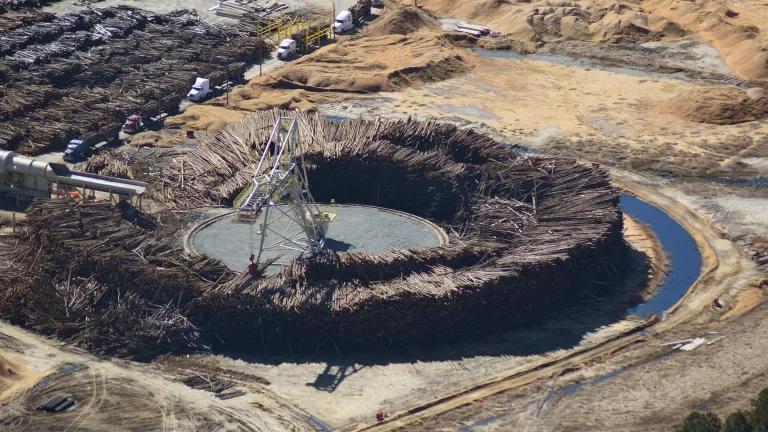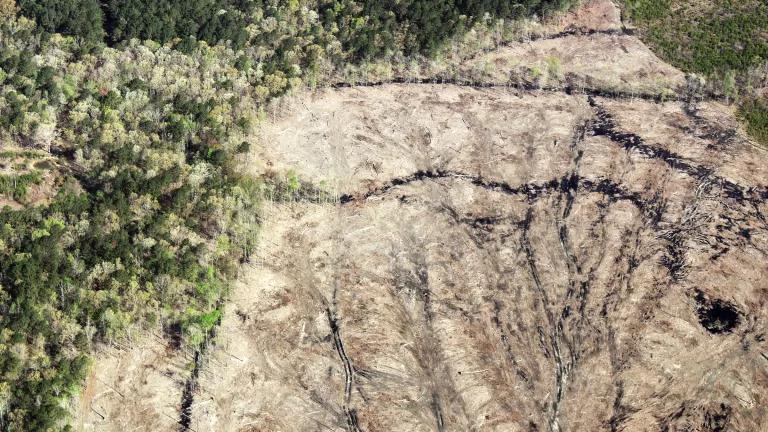Climate Week Participants Should Recognize Bioenergy as a Boondoggle
As Climate Week NYC begins, governments and companies shouldn't be fooled by industry claims that turning carbon-storing forests into wood pellets will save us.

Log pile for bioenergy production
Dogwood Alliance
As policymakers convene in New York for Climate Week, they will discuss policies to combat 2023’s record-smashing climate change impacts and associated heatwaves, wildfires, and floods. Devastating climate change can no longer be framed as decades away– it is here, ravaging cities and destroying lives. There is no time to squander on false climate “solutions” that siphon off funding from true renewable energy sources. One of these resource-guzzling boondoggles is the rapidly growing practice of turning forests into fuel and burning them for electricity in large commercial power plants–referred to as “bioenergy.”
In past years, governments and companies have used Climate Week to tout bioenergy as a so-called solution to the climate crisis. For example, last year, Drax—one of the world’s largest bioenergy companies and the UK’s single largest CO2 emitter—announced a carbon markets deal that would prop up Drax’s modus operandi: using forests to fuel its power plants and claiming its emissions will be captured and buried by costly, unproven technologies. The UK and other European nations import large volumes of wood pellets from the US and Canada, repeating Drax’s claims that bioenergy is helping them reduce their countries’ carbon emissions.
But companies like Drax wrongly characterize forest-based biomass as carbon neutral, when they claim that logged forests regrow and therefore neutralize the CO2 released by power plants. Burning wood pellets releases even more carbon dioxide than burning coal, primarily due to the enormous volumes of wood power plants require relative to other fuel, and the removal and destruction of forests’ carbon storing trees and soils. Additionally, investigations have found that Drax and other bioenergy producers rely on the logging of trees in biodiverse, primary/ old-growth forests in climate-critical forests including in Canada, and the U.S. Southeast.
The idea that carbon-storing trees should not be churned into wood pellets in power plants makes intuitive and scientific sense. But unfortunately, many governments have bought into this charade, and are directing valuable taxpayer subsidies toward forest-based biomass when it could support truly renewable energy. A 2022 report commissioned by NRDC found that 12 European countries, collectively, spent more than $7.5 billion dollars in subsidies for solid biomass electricity generation and combined heat and power (CHP) in 2020, increasing these subsidies by 27% between 2015 and 2020. The UK subsidizes the biomass industry to the tune of $2 billion dollars a year. In Canada, both government and industry representatives suggest that wood-based biomass should be considered more attractive to policymakers than cleaner forms of energy, citing the relative ease of switching coal power plants to use wood instead of building new clean energy infrastructure. And in the United States, NRDC is collaborating with partners in an effort to prevent biomass companies from taking advantage of funding intended for true renewables under the Inflation Reduction Act and other laws.
It’s not just governments like the UK that have turned to bioenergy to try to meet climate goals. One major feature of Climate Week might be new “net-zero” pledges by companies. But, as the 2023 Corporate Climate Responsibility Monitor concluded, the reliance of companies on bioenergy to help them meet their net zero targets is “very likely to have negative sustainability implications”.
The window for climate action gets smaller every day. Every dollar invested in projects that drive industrial logging for wood pellets, means a dollar is not invested in wind and solar power. And logging forests for bioenergy reduces forests’ carbon storage and communities’ resilience to extreme weather. During Climate Week—and every day— governments must stop repeating the biomass industry’s talking points, and direct public resources to the solutions that will actually ward off the worst impacts of climate change. The only thing worse than failing to address climate change is pretending to fix things, when actually making them worse.





